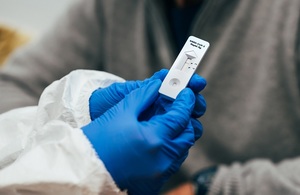
A new trial could lead to people contacted by test and trace no longer having to self isolate
Daily coronavirus tests will be given to as many as 40,000 people who have been in contact with someone who has tested positive for COVID-19, in a new government-backed study designed to gather evidence on safe alternatives to self-isolation for people who are contacts of positive COVID-19 cases.
If successful, the study – led by the UK Health Security Agency (including Public Health England and NHS Test and Trace) – could provide evidence to help to reduce the length of time people who are contacts of positive COVID-19 cases need to self-isolate, as parts of the economy and society reopen through the Roadmap. A reduction in the period of self-isolation from 10 days could help prevent individuals having to miss work, while allowing people to continue to safely participate in society.
The launch of the England-wide exercise builds on the research pilots taking place in businesses, hospitals and schools. Since December over 200 schools, 180 workplaces and over 800 individuals have participated in daily testing pilots, which have proved effective in reducing the need for people to self-isolate, while detecting cases of Covid-19 that would not have otherwise been found. Participants of pilots have been able to safely reduce the length of time spent in self-isolation upon receipt of a negative daily test result.
Currently, anybody who has been notified through NHS Test and Trace as a contact of someone who has tested positive for COVID-19 must self-isolate for 10 days. For those contacts without symptoms, the new study aims to find out if people can replace the need to self-isolate by taking a test every day instead.
Close contacts of people with COVID-19 will be contacted by phone and sent 7 days’ worth of lateral flow tests (LFDs). The contacts are required to test themselves each morning for 7 days. People who test negative and develop no symptoms will be exempt from the legal duty to self-isolate that day and can leave their home to carry out essential activity.
They will need to take another test the next morning to see if they need to self-isolate that day or continue to be exempt. Individuals will still have to adhere to current restrictions, including following the rules on hands, face and space, and only those formally enrolled in the research study will be exempt from usual legal duties.






